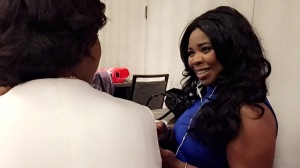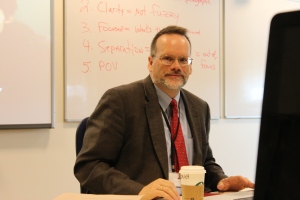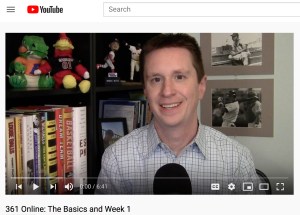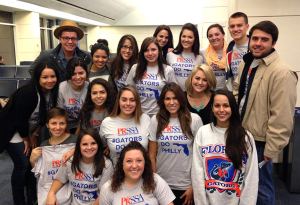Congratulations to the 20 University of Florida graduate students who received Graduate Student Teaching Awards for 2020-2021.
Here is the list of the award winners, including the top two who received the Calvin A. VanderWerf Award.


Congratulations to the 20 University of Florida graduate students who received Graduate Student Teaching Awards for 2020-2021.
Here is the list of the award winners, including the top two who received the Calvin A. VanderWerf Award.

So many class discussions could become an improved learning experience for students with a little more guidance from the instructor.
That assessment is based on observing classes as a member of the University of Florida Graduate Student Teaching Awards Committee.
I’ve been listening to class discussions in a wide range of disciplines – psychology, educational technology, acting, kinesiology, history and microbiology to name just some.
Some instructors have led probing insightful discussions, but many discussions remained at a superficial level.
The instructor posed a good opening question that often results with a student providing a very concise “correct answer.” The instructor validates the student’s response but often moves on rather than digging deeper into that correct answer.
Bloom’s Taxonomy is a good reference for designing questions to guide small-group or full-class discussions. The taxonomy originally was published in 1956 by a team of University of Chicago cognitive psychologists and named after Benjamin Bloom who was the committee’s chair.

If you’re like most instructors this fall, you are doing some – or perhaps all – of your teaching online due to Covid-19. You miss being able to safely be in the classroom with your students.
But teaching online provides you an opportunity to do something that rarely happens when you are teaching in person.
You can record yourself as you teach and then use the recording to assess yourself and take steps to improve your teaching.

Over the years, I’ve recorded and critiqued my voice. I used an audio recorder and then my iPhone to record when I was teaching face-to-face classes. When I was doing on-air fundraising for the local public radio station, I asked a friend to record my shifts. As part of a team creating online instruction through GoToMeeting, I would listen to the recorded session.
When I created a course for the University of Florida’s UF Online, I had the opportunity each time I recorded a lecture to hear how my voice sounded to my students. This semester, as part of the University of Florida’s orientation for new teaching assistants, I recorded my session at home using my laptop and its built-in microphone.
I’m now observing teaching assistants who are nominees for UF’s Graduate Student Teaching Award. Typically, I’d observe them in classrooms, labs and studios where they would be teaching. But now I observe them teaching with Zoom or through recorded videos.
Listening to yourself teach – even just one class – can help you make adjustments to improve your teaching.
Continue readingZoom breakout rooms are a teaching tool being used more frequently as universities invest in the application and as instructors become more familiar in setting up and using the breakout rooms.
Having students work in breakout rooms can provide a change of pace in class and enable more students to engage actively in class.
As a member of the University of Florida’s Graduate Student Teaching Awards Committee, I have observed graduate students utilizing Zoom breakout rooms in a wide range of subject areas. Whereas instructors typically only make brief visits to breakout rooms during class, I have been able to observe the full time students are in a breakout room.
Based on my observations, I’m offering a few suggestions for using Zoom breakout rooms.
Develop an effective breakout room assignment.
Creating a good breakout room assignment is like creating a good small group discussion activity for face-to-face classes. Consider what a small group discussion will accomplish in a more productive way than a full-class discussion.
I’ve been part of the University of Florida’s orientation for new teaching assistants for a number of years. My topic has been advice for having a successful start to the school year.

This was what my presentation looked like at the 2019 orientation for new teaching assistants. Photo by Daniel Brotherton
Prior to this year, the 400 new teaching assistants would meet in a large auditorium for the orientation.
Due to Covid-19, this year’s orientation went online.
Over four days, part of the orientation was held live via Zoom, with about 100 different TAs attending each day.

This is what my presentation looked like for the 2020 TA orientation. Click on the link at the end of the post to watch the video.
The other portion of the orientation, which included my presentation, were recorded videos. (At the end of this post you can click on a link to watch the video.)
In creating my presentation, I considered what would be helpful advice for starting a school year in a pandemic.
How can you use technology to improve your teaching and create a better learning experience for your students?

Kortni Alston critiques a resume tape with a student at the National Association of Black Journalists Regional Conference in Dallas.
I talked with Dr. Kortni Alston about that question.
Alston, assistant professor at North Carolina A&T State University, discussed strategies she uses that have been particularly helpful when she adapted her teaching during the pandemic.
Alston earned her MBA from Morgan State University and her Ph.D. in Communication at the University of Florida, writing her dissertation on positive psychology issues related to job satisfaction.
Prior to teaching in higher ed, Alston was a television reporter, a director of news and public affairs for public radio, and was director of external affairs for the Ron Clark Academy in Atlanta.
What a time in higher education due to COVID-19. The spring semester with the dramatic shift to online classes has ended and virtual graduation ceremonies held. But what plans are being considered for the start of the school year next fall?
I asked Dr. David Bulla, professor and chair of the Department of Communications at Augusta University, to share his outlook from an administrator’s perspective. Bulla, a Civil War historian, taught at Iowa State University and Zayed University in the United Arab Emirates prior to joining the faculty at Augusta University.
by David W. Bulla
The first challenge is the novel coronavirus itself.

David Bulla at Augusta University
Once we return to face-to-face classes, how do we discourage students who exhibit virus symptoms not to attend class? How do we notify the classmates of students who have tested positive? We’re working on that policy right now.
We also have students working on the front lines—students who work in medical centers. After all, Augusta University is the home of the Medical College of Georgia, and quite a few health sciences students take media literacy and health communication classes that my department teaches, and all AU students have to take our public speaking class.
At the same time, while the novel coronavirus has come to dominate all of our waking thoughts and monopolizes the information coming to us from the news media, we really do not know that much about it.
Congratulations to the 20 graduate students selected as the University of Florida Graduate Student Teaching Award winnners for 2019-2020.
The graduate students were nominated by their departments and were evaluated by the Graduate Student Teaching Awards Committee.
Each student submitted a teaching portfolio, including teaching philosophy and teaching evaluations, and was observed by two members of the committee.
2019-2020 Winners
The top two graduate students received the Calvin A. VanderWerf Award:
In this time of unprecedented changes in higher education due to the Covid-19 pandemic, faculty, teaching assistants and adjuncts are scrambling to move their face-to-face classes to distance learning experiences.

Kevin Hull set up a small studio in a room in his house to record YouTube videos for his courses.
I asked Kevin Hull, assistant professor in the School of Journalism and Mass Communications at the University of South Carolina, to share some insights from his experience of moving his classes to online delivery.
Hull, who also is Sports Media Lead at U of SC, was recognized this year by the university as a Breakthrough Star for his accomplishments in research at U of SC and was named a Promising Professor by the Association for Education in Journalism and Mass Communication (AEJMC) in 2018.
Prior to teaching at U of SC, Hull was a news reporter and sports reporter/sports anchor at WECT-TV in Wilmington, North Carolina, and a digital media teacher at Topsail High School in Hampstead, North Carolina.
Julie Dodd: How did you feel when you learned that you were going to be teaching your face-to-face class in a digital format?
Kevin Hull: My friend’s wife is in grad school at Boston University, and he said that she was told to be prepared for the class she was taking to be online after Spring Break. That was the first I had even thought of the possibility being a reality, but that turned out to be a big help as I started to mentally prepare myself that it might be coming for me, too. That got me starting to think about how I could alter assignments, how to do some lectures, and what would need dramatic changes. When the word came down at U of SC, I wasn’t caught completely flat-footed.
The end of a term is challenging for college students as they complete final projects and take exams.

These students were on the way to the PRSSA national convention. Being involved in a professionally focused student organization helps students learn more about the field and make contacts that can lead to internships and jobs.
But for many students, another big challenge comes after the term is completed and the grades are determined.
That’s when they go home and are asked by their parents, relatives and others who know them in the community: “What do you plan to do after you graduate?”
Students (even freshmen) often feel like they should know what their career goal is. But many aren’t sure or are hesitant to announce career goals in case all doesn’t go as planned.
I was reminded of students’ career concerns when I recently observed a graduate student teaching assistant who was teaching the last lab of the semester.
He ended class by asking how many students knew what their career goals were. About a third raised their hands…with a few more raising their hands, it seemed, as they thought they should know.